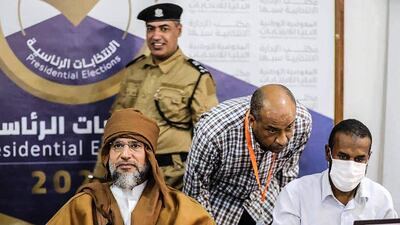The son of ousted Libyan dictator Muammar Qaddafi has registered to run in the country's presidential election.
Saif Al Islam Qaddafi's candidature was confirmed to The National by the High National Election Commission on Sunday.
Appearing in tan clothing and traditional headdress, he arrived at the commission's branch office in Libya's south-west city of Sabha, 10 years after his father was killed.
Candidate registrations opened on November 9 and will end on November 26, the commission has said. The poll will be held on December 24.
Mr Qaddafi, once heir apparent to his father, is wanted by the International Criminal Court for crimes against humanity perpetrated during protests in 2011.
The unrest led to a military intervention in Libya by Nato. His father was removed from power and later killed following an ambush by rebel fighters.
Rumours about Mr Qaddafi's intention to run in the election began to circulate weeks ago. Several observers became convinced that he was more likely to endorse a candidate than become one himself.
"There has been much speculation about this moment," said Mohamed Eljarh, Libyan affairs expert and co-founder of Libya Outlook for Research and Consulting.
"Many of us believed he made up his mind about not running [and] backing a candidate instead. Saif and his team thought otherwise," he wrote on Twitter after the announcement on Sunday.
Mr Qaddafi was captured by militias in November 2011 and released from detention in 2017.
He was sentenced to death by a court in Tripoli, an announcement that was condemned by rights groups including Human Rights Watch, which said he was not given due process.
The ICC added to the international criticism before the verdict was overturned in 2016, although the ICC has upheld allegations implicating Mr Qaddafi in human rights abuses.
Mr Qaddafi, who was educated in London, has rarely appeared in public since then, but in October he told The New York Times of his plans for a political comeback.
It remains unclear what a potential presidential win would mean for Mr Qaddafi's status as an internationally wanted criminal.
"Saif Al Islam belongs on the list of wanted criminals and not on lists of electoral candidates," said Abdel Rahman Al Sewehli, the former head of Libya's Supreme Council of State, who lives in Tripoli.
"Whomever thinks that Libya will return to a state of dictatorship after all these sacrifices is delusional."
Libya has been in turmoil since Muammar Qaddafi was ousted in 2011 and has been beset by factionalised politics, corruption, militias and the trafficking of illegal migrants, all of which are issues that the country's first elected leader will need to address.
A committee will review Mr Qaddafi's papers, and those of the others who have registered, before approving them as official candidates in the December election.


